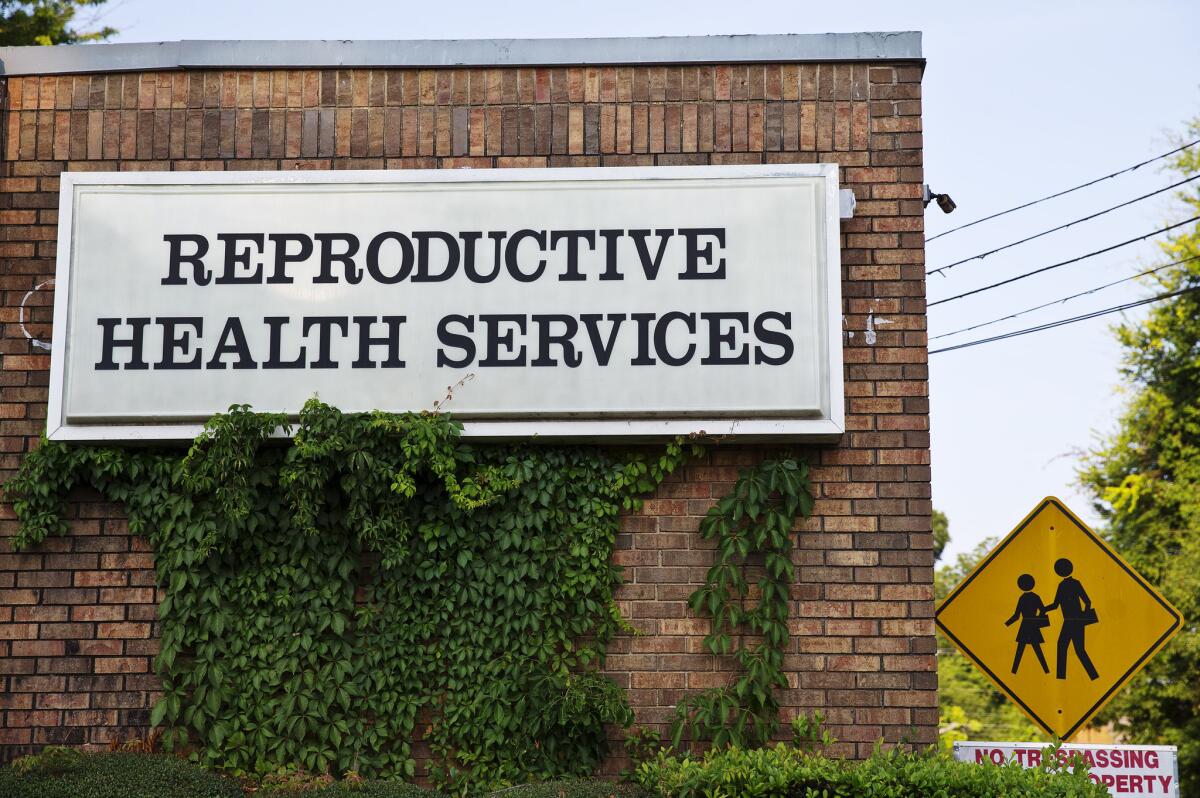Are abortion rights equal to gun rights? Yes, says a federal judge

- Share via
Last week, a federal court judge in Alabama produced a ruling that should bring joy to anyone alarmed by how Republican legislatures have been trying to regulate abortion clinics out of existence. They know they can’t make abortion illegal, so they have thrown up every roadblock they can think of to reduce access to the procedure.
Well, not so fast, said Judge Myron H. Thompson of the United States District Court for the Middle District of Alabama. In a 172-page decision, he wrote that Alabama’s new law requiring abortion doctors to have hospital admitting privileges is unconstitutional. It would put three of the state’s five abortion clinics out of business, he found, which would impose “severe and even, for some women, insurmountable obstacles” to abortion in Alabama.
Using legal guidelines established in the Supreme Court’s 1992 Planned Parenthood vs. Casey decision, he found the law puts an undue burden on women, which is unconstitutional.
Thompson also said he was struck by the parallels between gun rights and abortion rights, which former New York Times Supreme Court reporter Linda Greenhouse described as “a pairing no previous judicial opinion has made.”
“[N]either right can be fully exercised without the assistance of someone else,” the judge wrote. “The right to abortion cannot be exercised without a medical professional, and the right to keep and bear arms means little if there is no one from whom to acquire the handgun or ammunition.”
Imagine the outcry, he said, if Alabama regulated all but two gun stores out of existence.
Thompson meticulously demolished the state’s argument that such a law safeguards patient safety and functions as a way of ensuring medical competence among doctors. It does exactly the opposite, he said.
In order to have admitting privileges, he said, most hospitals require doctors to admit a certain number of patients per year. But complications from early abortions (the only kind performed in Alabama, where abortion after 20 weeks is illegal) are so “vanishingly rare,” as he put it, that such a quota could never be met.
A patient, he wrote, is two to three times more likely to die from a penicillin shot than an abortion.
The beautiful thing about this ruling is that it is so firmly grounded not just in the law, but in the law’s application in the real world.
He understands that most of the state’s women who seek abortion are poor, and that being forced to travel to another city to obtain an abortion adds a real, not hypothetical, financial and emotional burden. With access to abortion “radically diminished” under the Alabama law, he wrote, desperate women unable to afford a 150-mile trip to a clinic, would turn to unregulated, illegal Internet sales of abortion-inducing medications. “At the worst,” he wrote, “there is a danger that women would attempt surgical abortions on themselves.”
He understands — and chronicles at length — the long, sordid history of violence against abortion providers in Alabama, reminding us that the first abortion doctor to die in the line of duty, as it were, was Dr. David Gunn, an Alabama abortion provider, who was slain outside his Florida clinic in 1993 by an anti-abortion extremist after Gunn’s name, photo and contact information were distributed at an anti-abortion rally in Montgomery, Ala.
More important, he understands exactly how the terrorizing effect of violence has changed the way abortion doctors live and work, making it impossible for them to be eligible for admitting privileges. Because of the ongoing violence and harassment, most of the doctors who perform abortions in small to mid-sized Alabama cities like Montgomery, Birmingham and Mobile do not live in those places. It’s too risky and too stigmatizing for them. (During the trial, the abortion doctors testified behind black curtains. Their identities are not revealed in the ruling, either, where they are called Dr. A, Dr. B and so on.)
The doctors fly in to their clinics from other places, weekly or monthly. One comes to Alabama from Chicago (where she has admitting privileges at her Illinois hospital). Another, incredibly, comes all the way from Nigeria, and stays in Atlanta during her visits to the U.S.
But in order to receive admitting privileges at a hospital, doctors must live no further than an hour away. Thompson grasps the Catch-22 craziness of that, and finds it unconstitutional.
(And then there is the abject cowardice -- my phrase, not his -- of some hospital officials, who could extend admitting privileges, but won’t, for political reasons. One of the abortion doctors, identified only as Dr. Roe, testified that the chairman of the University of Alabama-Birmingham’s obstetrics/gynecology department refused to consider her even though she had once been on the faculty there.)
Forcing the closure of clinics, of course, has always been the goal of these laws, which have also been challenged in Mississippi, where a federal appeals court blocked a similar law that would have shut down that state’s only abortion clinic, and in Texas, where closing arguments were expected Wednesday in a challenge to another such law.
It seems inevitable that the Supreme Court will be addressing these laws at some point. Here’s hoping that when it does, Judge Thompson’s words will ring in their ears.
More to Read
Sign up for Essential California
The most important California stories and recommendations in your inbox every morning.
You may occasionally receive promotional content from the Los Angeles Times.











